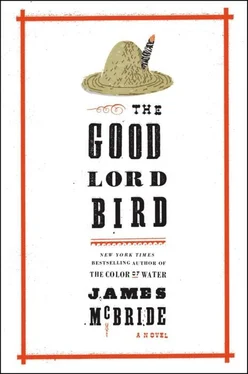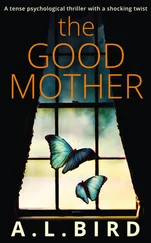The Good Lord Bird
by James McBride
For Ma and Jade,
who loved a good whopper
Rare Negro Papers Found
by A. J. Watson
Wilmington, Del. (AP) June 14, 1966— A fire that destroyed the city’s oldest Negro church has led to the discovery of a wild slave narrative that highlights a little-known era of American history.
The First United Negro Baptist Church of the Abyssinia at 4th and Bainbridge Streets was destroyed by fire last night. Fire officials blamed a faulty gas heater. No one was injured in the blaze. But among the scorched remains were several charred notebooks belonging to a late church deacon that have attracted national academic interest.
Charles D. Higgins, a congregation member since 1921, died last May. Higgins was a cook, but also an amateur historian who apparently recorded the account of another elderly United Baptist congregation member, Henry “the Onion” Shackleford, who claimed to have been the only Negro to survive the American outlaw John Brown’s raid on Harpers Ferry, Va., in 1859. Brown, a white abolitionist, attempted to capture the nation’s largest arsenal to start a war on slavery. The failed raid caused a national panic and prompted the start of America’s Civil War. It led to Brown’s hanging, as well as the deaths of most of his 19 accomplices, including four Negroes.
Until now, no full account of Brown or of his men has ever been found or known to exist.
The account was contained in a metal fireproof box hidden under the floorboards of the deacon’s chair behind the pulpit, where Higgins held court faithfully every Sunday for more than 43 years. Also in the box was an envelope containing 12 Confederate dollars, a rare feather from an ivory-billed woodpecker, a nearly extinct bird species, and a note from Mr. Higgins’s late wife which read, “If I ever see you again, I’ll send your ass hooting and hollering out my damn door.”
Mr. Higgins had no children. He worked as a cook for Mrs. Arlene Ellis of Chadds Ford, Pa., for 29 years. He was the eldest member of the First United Baptist, where he was known affectionately to congregation members as “Mr. Whopper” and “Deacon Shimmy Wimmy.” His exact age at his death was unknown, but congregation members guessed it at close to 100. He was also something of an attraction at local city council meetings, where he often attended sessions dressed in Civil War regalia and petitioned the council to rename the Dupont Highway the “John Brown Road.”
His neatly bound notebooks claim that he gathered the facts of Mr. Shackleford’s life in a series of interviews conducted in 1942. According to Mr. Higgins, he first made the acquaintance of Mr. Shackleford when they both served as Sunday school teachers at First United in the early ’40s, until Shackleford was tossed from the church in 1947 for what Mr. Higgins writes as “scoundreling and funny-touching a fast li’l something named Peaches... .”
Apparently, according to Mr. Higgins’s papers, the church members believed Mr. Shackleford was a woman before that incident. He was apparently a small man, according to Mr. Higgins, “with girly features, curly hair ... and the heart of a rascal.”
Mr. Higgins claims Mr. Shackleford was 103 years old when the account was recorded, though he writes, “It could be more. Onion had me by at least 30 years.”
While Mr. Shackleford is listed in the 1942 church registry, which survived the fire, no one in the current congregation is old enough to recall him.
The congregation has announced plans to pass the account of Mr. Shackleford to a Negro history expert for verification, and later sell the notebooks for publication, with the proceeds going toward the purchase of a new church van.
PART I.
FREE DEEDS
(Kansas)
Iwas born a colored man and don’t you forget it. But I lived as a colored woman for seventeen years.
My Pa was a full-blooded Negro out of Osawatomie, in Kansas Territory, north of Fort Scott, near Lawrence. Pa was a barber by trade, though that never gived him full satisfaction. Preaching the Gospel was his main line. Pa didn’t have a regular church, like the type that don’t allow nothing but bingo on Wednesday nights and women setting around making paper-doll cutouts. He saved souls one at a time, cutting hair at Dutch Henry’s Tavern, which was tucked at a crossing on the California Trail that runs along the Kaw River in south Kansas Territory.
Pa ministered mostly to lowlifes, four-flushers, slaveholders, and drunks who came along the Kansas Trail. He weren’t a big man in size, but he dressed big. He favored a top hat, pants that drawed up around his ankles, high-collar shirt, and heeled boots. Most of his clothing was junk he found, or items he stole off dead white folks on the prairie killed off from dropsy or aired out on account of some dispute or other. His shirt had bullet holes in it the size of quarters. His hat was two sizes too small. His trousers come from two different-colored pairs sewn together in the middle where the arse met. His hair was nappy enough to strike a match on. Most women wouldn’t go near him, including my Ma, who closed her eyes in death bringing me to this life. She was said to be a gentle, high-yaller woman. “Your Ma was the only woman in the world man enough to hear my holy thoughts,” Pa boasted, “for I’m a man of many parts.”
Whatever them parts was, they didn’t add up to much, for all full up and dressed to the nines, complete with boots and three-inch top hat, Pa only come out to ’bout four feet eight inches tall, and quite a bit of that was air.
But what he lacked in size, Pa made up for with his voice. My Pa could outyell with his voice any white man who ever walked God’s green earth, bar none. He had a high, thin voice. When he talked, it sounded like he had a Jew’s harp stuck down his throat, for he spoke in pops and bangs and such, which meant speaking with him was a two-for-one deal, being that he cleaned your face and spit-washed it for you at the same time—make that three-for-one, when you consider his breath. His breath smelled like hog guts and sawdust, for he worked in a slaughterhouse for many years, so most colored folks avoided him generally.
But white folks liked him fine. Many a night I seen my Pa fill up on joy juice and leap atop the bar at Dutch Henry’s, snipping his scissors and hollering through the smoke and gin, “The Lord’s coming! He’s a’comin’ to gnash out your teeth and tear out your hair!” then fling hisself into a crowd of the meanest, low-down, piss-drunk Missouri rebels you ever saw. And while they mostly clubbed him to the floor and kicked out his teeth, them white fellers didn’t no more blame my Pa for flinging hisself at them in the name of the Holy Ghost than if a tornado was to come along and toss him across the room, for the Spirit of the Redeemer Who Spilt His Blood was serious business out on the prairie in them days, and your basic white pioneer weren’t no stranger to the notion of hope. Most of ’em was fresh out of that commodity, having come west on a notion that hadn’t worked out the way it was drawed up anyway, so anything that helped them outta bed to kill off Indians and not drop dead from ague and rattlesnakes was a welcome change. It helped too that Pa made some of the best rotgut in Kansas Territory—though he was a preacher, Pa weren’t against a taste or three—and like as not, the same gunslingers who tore out his hair and knocked him cold would pick him up afterward and say “Let’s liquor,” and the whole bunch of ’em would wander off and howl at the moon, drinking Pa’s giddy sauce. Pa was right proud of his friendship with the white race, something he claimed he learned from the Bible. “Son,” he’d say, “always remember the book of Heziekial, twelfth chapter, seventeenth verse: ‘Hold out thy glass to thy thirsty neighbor, Captain Ahab, and let him drinketh his fill.’”
Читать дальше












